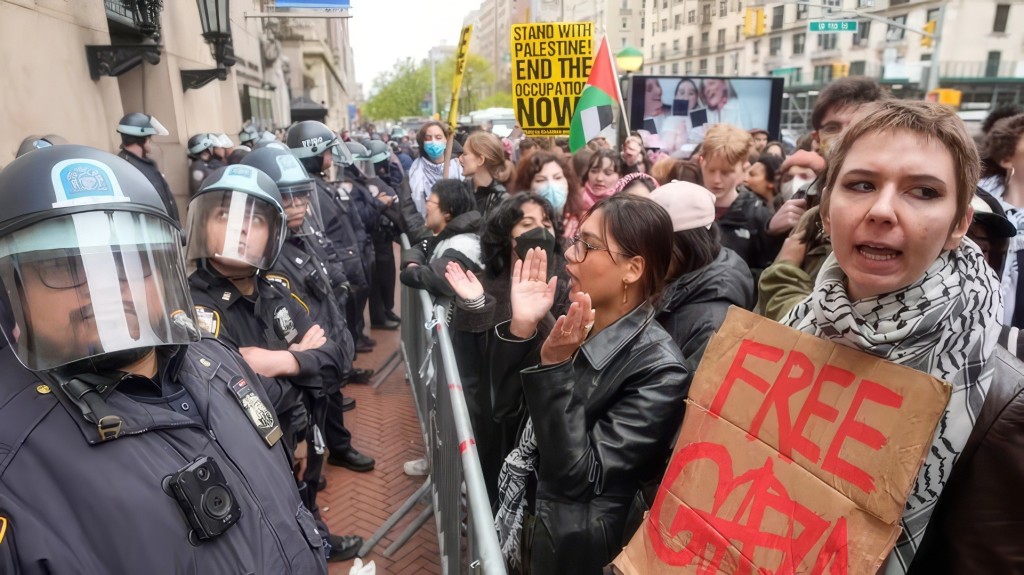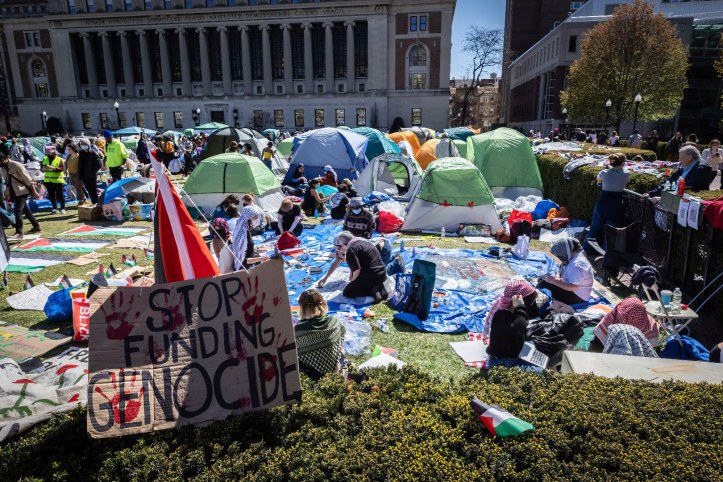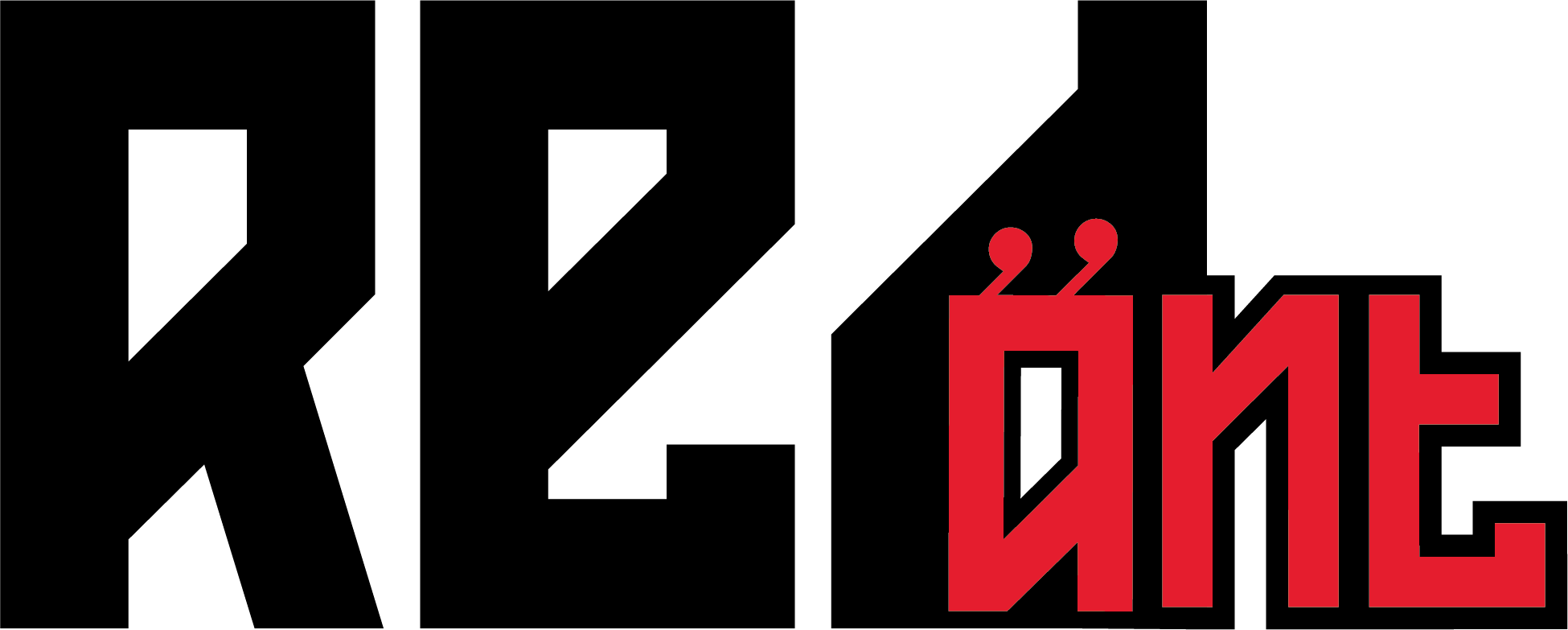
By Barry Sheppard
The launch of Israel’s campaign of mass killing of Palestinians and destruction of Gaza, following the events of 7 October 2023, has seen the emergence of significant protests on U.S. campuses.
In response to the emerging protest movement, supporters of Israel’s war have charged campus pro-Palestinian demonstrations with anti-Semitism. As the killings and destruction have intensified, many types of antiwar protests in American society have increased, and so have the demands of Israel’s supporters to suppress pro-Palestinian faculty and students.
Recently, at the University of Southern California (USC) a South Asian American Muslim student, Asia Tabassum, was chosen by USC to be her graduating class valedictorian, based on her grades. Almost immediately, pro-Israel forces on and off the campus demanded she be removed as valedictorian. A Muslim and pro-Palestinian, she was personally barraged with hate speech.
The USC administration capitulated and announced on 15 April that Tabassum would not give the commemoration address at her class’s graduating ceremonies; regular events at high school and colleges. USC’s decision is noticeably rare. USC provost and senior vice-president for academic affairs, Andrew Guzman, cited safety concerns but no one has explained what those “concerns” were. Tabassum posted a response on the website of the Council on American-Islamic Relations, saying, in part, “I’m not surprised by those who attempt to propagate hatred. I am surprised that my own university – my home for four years – has abandoned me.”
USC students and faculty immediately protested. This led USC to cancel the commencement speech entirely and state that outside speakers, including those to be given honorary degrees, would not attend, presumably for fear they might make a pro-Palestinian statement.
BATTLES RETURN TO COLUMBIA UNIVERSITY
USC wasn’t the only college administration to clamp down on the pro-Palestine movement. In mid-April protesting students built an encampment on Columbia University’s New York campus. In addition to opposing Israel’s war in Gaza, the students demanded that the University divest its investments in the U.S. massive weapons program being sent to Israel.
In response, Columbia suspended three women students from the University’s historically largely female Barnard College – Isra Hirsi, Maryam Iqbal, and Soph Dinu – for participating in the encampment. Isra Hirsi is the daughter of representative in Congress from Minneapolis, Minnesota, Ilan Omar, one of two Muslim members of Congress and the first woman of color to be elected from Minnesota. Other protestors were suspended a day later. Suspension meant exclusion from attending classes, from using their dormitory rooms, and from taking meals in the cafeteria.
Columbia University President, Minouche Shafik, after facing a grilling by the witch-hunting Congressional bipartisan committee (which was itself campaigning for university and college officials to ban pro-Palestinian demonstrations) called on the police to break up the protest. The police reported that the encampment was peaceful and there was no violence or threats.
Nevertheless, on 18 April, a few days after USC cancelled its commencement address, the encampment was attacked by police. According to police, 133 peaceful arrests were made, the greatest number arrested at Columbia University since 1968, when some 700 were arrested during an occupation by anti-Vietnam War students. Shafik is yet to mount a credible argument for her decision. In the end, the arrested activists were charged with “trespassing” on their own campus!
Columbia students have reacted to the attack by holding actions on the campus every day since. The University, in turn, is blocking all “outsiders” from the campus, forcing some like Cornell West, the well-known Black activist and professor as the Columbia-affiliated Union Theological Seminary, to jump a fence to participate in the demonstration. West is an independent candidate for the presidency in November’s election. He told independent news program Democracy Now that he lauded the students for “fighting in the face of domination and occupation and doing it with tremendous determination.”
PROTESTS SPREAD AS THE WHITE HOUSE CONDEMNS
Democracy Now presenter, Amy Goodman, reported on 23 April: “As Israel’s assault on Gaza enters its 200th day, Palestinian solidarity protests and encampments are spreading on college campuses across the United States, inspired by the Gaza Solidarity Encampment at Columbia University.” She said:
Here in New York, police raided a student encampment at New York University Monday night [18 April]. Police arrested more than 150 people, including students and 20 faculty members. Earlier on Monday, police at Yale University arrested 60 protesters, including 47 students who had set up an encampment to demand the school divest from weapons manufacturers….Other campuses where encampments are occurring are now in place at numerous other schools, including University of Michigan-Ann Arbor; University of California, Berkeley; University of Maryland; MIT and Emerson College in Boston.
The common theme justifying the suppression of pro-Palestinian demonstrations is to claim they aim to frighten and threaten Jewish students on campuses. The White House has joined this chorus as the New York Times reports:
President Biden condemned antisemitism on college campuses in a statement on Sunday, three days after more than 100 people protesting the Gaza war on Columbia University’s campus were arrested.
Biden’s statement, which came as part of a lengthy Passover greeting he issued from the White House, didn’t name Columbia directly but said there had been “harassment and calls for violence against Jews” in recent days.
This blatant Antisemitism is reprehensible and dangerous — and it has absolutely no place on college campuses, or anywhere in our country,” the statement said….
Earlier Sunday [21 April], the White House issued a separate statement directly in response to anti-Israel protests at Columbia, which are continuing this week as students occupy the university grounds in tented encampments.
“While every American has the right to peaceful protest, calls for violence and physical intimidation targeting Jewish students and the Jewish community are blatantly Antisemitic, unconscionable, and dangerous,” said the statement from Andrew Bates, deputy White House press secretary….
The protest at Columbia University came the same week as many other demonstrations across the country that were meant to highlight Israel’s war in Gaza. Protesters have blocked major roads in New York and San Francisco and airport access roads in Chicago and Seattle.
Students in favour of Israel’s war may feel increasingly in a minority on campuses. However, charges of anti-Semitic violence by anti-war students are baseless – no examples have been given. This narrative also excludes the significant section of Jewish students who are part of the pro-Palestinian actions, who often play a leading role. In the example of Columbia, a group called Jewish Voice for Peace (JVP) played such a leading role from November 2023. Consequently, it was one of the organizations Columbia officially banned. JVP carried on regardless.

ANTI-WAR JEWISH VOICES SING: THE START OF A NEW RADICALISATION?
Monday 22 April was the beginning of the Jewish holiday of Passover, which celebrates the liberation of Jews from Egypt and has come to symbolize liberation for all oppressed people. Celebrations of Passover occurred in many of the occupations. The staunchly pro-Israel New York Times admitted that:
On the first night of Passover, the singsong of the Four Questions echoed from Jewish homes and gatherings around the world, including from unlikely, contested spaces: the center of pro-Palestinian protests at Columbia and other universities where demonstrations are taking place.
As evening fell over Columbia’s tent encampment on Monday, about 100 students and faculty gathered in a circle around a blue tarp heaped with boxes of matzo and food they had prepared in a kosher kitchen. Some students wore kaffiyehs, the traditional Palestinian scarf, while others wore Jewish skullcaps. They distributed handmade Haggadahs – prayer books for the Passover holiday – and read prayers in Hebrew, keeping to the traditional order.
So much for the “anti-Semitism” of pro-Palestinian students. Various commentators note the similarity of these occupations to those of the 1960s. Are we seeing a new wave of student radicalization?

It is about time for students to step up again…..chuq